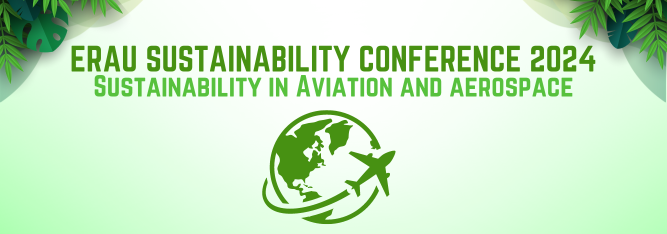
Sustainable Flight Training Schools and their role to meet Net Zero Targets
Presentation Type
None
In Person or Zoom Presentation
In-Person
Location
Student Union Event Center
Start Date
18-11-2024 9:20 AM
Presentation Description/Abstract
This presentation is part of a wider research project to identify the elements that must be considered regarding flight training schools' role in aviation sustainability. Net Zero Pathways and goals, emission schemes, design specifications, and sustainable fuels are some of the most popular changes for airlines and manufacturers. However, from the sustainability perspective, all aviation operations and organizations can contribute to Net Zero goals and define their contribution to that direction with direct or indirect practices and approaches. New technologies used in flight schools, like Synthetic Flight Training, Virtual Reality (VR) & Augmented Reality (AR), are examples of sustainable transformation of the training process. Flight schools also contribute to environmental and economic sustainability through social aspects. Today's trainees are tomorrow's pilots who should be the leaders of sustainable air operations. The ICAO Carbon Offsetting Requirement Scheme for International Airlines (CORSIA) relies heavily on the firm and reliable information in the operators' system. Proper emission calculation requires flight crews to feed valid and accurate flight information data. Hence, flight schools play a decisive role in aviation sustainability, creating and supporting an emerging sustainable culture for young pilots. How can flight training schools transform the existing culture and enhance a new one through their training schemes without compromising safety? What is the student's perspective about their role in sustainability in aviation? A short survey is distributed to aviation pilots in an effort to answer some of the questions posed and offer recommendations in flight schools incorporating sustainability practices and shaping young pilots' minds.
Sustainable Flight Training Schools and their role to meet Net Zero Targets
Student Union Event Center
This presentation is part of a wider research project to identify the elements that must be considered regarding flight training schools' role in aviation sustainability. Net Zero Pathways and goals, emission schemes, design specifications, and sustainable fuels are some of the most popular changes for airlines and manufacturers. However, from the sustainability perspective, all aviation operations and organizations can contribute to Net Zero goals and define their contribution to that direction with direct or indirect practices and approaches. New technologies used in flight schools, like Synthetic Flight Training, Virtual Reality (VR) & Augmented Reality (AR), are examples of sustainable transformation of the training process. Flight schools also contribute to environmental and economic sustainability through social aspects. Today's trainees are tomorrow's pilots who should be the leaders of sustainable air operations. The ICAO Carbon Offsetting Requirement Scheme for International Airlines (CORSIA) relies heavily on the firm and reliable information in the operators' system. Proper emission calculation requires flight crews to feed valid and accurate flight information data. Hence, flight schools play a decisive role in aviation sustainability, creating and supporting an emerging sustainable culture for young pilots. How can flight training schools transform the existing culture and enhance a new one through their training schemes without compromising safety? What is the student's perspective about their role in sustainability in aviation? A short survey is distributed to aviation pilots in an effort to answer some of the questions posed and offer recommendations in flight schools incorporating sustainability practices and shaping young pilots' minds.
